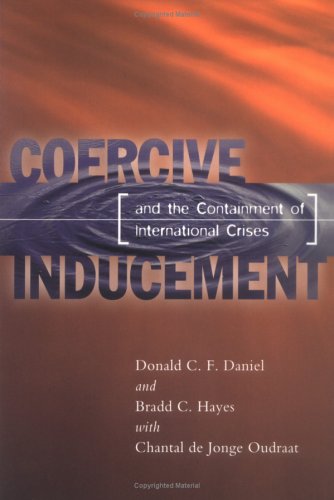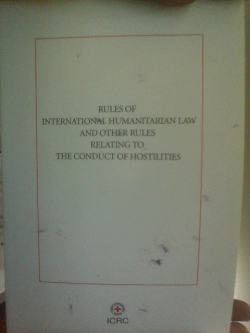Coercive Inducement and the Containment of International Crises

Buy online ($)
Type
Book
Authors
ISBN 10
1878379844
Category
341-International Law
[ Browse Items ]
Publication Year
1999
Publisher
Pages
272
Subject
United Nations -- Armed Forces; Intervention (International law); Security, International;
Tags
Abstract
The concept of a middle ground between simple peace enforcement and traditional peacekeeping by lightly armed observers has been both ill defined and controversial. But the authors of this thoughtful yet challenging volume make a strong case for both the practicability and the desirability of such operations. Coercive inducement the term was suggested by Kofi Annan, when he was undersecretary general for peacekeeping is a form of coercive diplomacy that relies more on the deployment and demonstration of military force than on the use of force per se. In the absence of such an option, the international community finds it hard to respond to a variety of crises, including ones that can spiral into genocide.After first laying out general principles, the book explores four recent UN operations (in Somalia, Rwanda, Bosnia, and Haiti) in which coercive inducement was particularly relevant, and then presents operational guidelines for its use. Clear-sighted and pragmatic throughout, the authors conclude by suggesting when and to what extent the international community should commit itself to undertake coercive inducement."
Description
The concept of a “middle ground” between simple peace enforcement and traditional peacekeeping by lightly armed observers has been both ill defined and controversial. But the authors of this thoughtful yet challenging volume make a strong case for both the practicability and the desirability of such operations.“Coercive inducement”―the term was suggested by Kofi Annan, when he was undersecretary general for peacekeeping―is a form of coercive diplomacy that relies more on the deployment and demonstration of military force than on the use of force per se. In the absence of such an option, the international community finds it hard to respond to a variety of crises, including ones that can spiral into genocide.After first laying out general principles, the book explores four recent UN operations (in Somalia, Rwanda, Bosnia, and Haiti) in which coercive inducement was particularly relevant, and then presents operational guidelines for its use. Clear-sighted and pragmatic throughout, the authors conclude by suggesting when and to what extent the international community should commit itself to undertake coercive inducement. - from Amzon
Biblio Notes
CONTENTS
1. Confusion and Discord in Recent UN Peace Support Operations…………p 7
2. A Practicable Middle Option and Associated Principles…………………..……p 21
3. Bosnia by Chantal de Jonge Oudraat……………………………………………..…….p 41
4. Somalia……………………………………………………………………………………………......p 79
5. Rwanda…………………………………………………………………………………………....…..p 113
6. Haiti By Chantal de Jonge Oudraat………………………………………………….…..p 147
7. Operational Guideline……………………………………………………………………...……p 169
8. Final Thoughts……………………………………………………………………………………...p 189
1. Confusion and Discord in Recent UN Peace Support Operations…………p 7
2. A Practicable Middle Option and Associated Principles…………………..……p 21
3. Bosnia by Chantal de Jonge Oudraat……………………………………………..…….p 41
4. Somalia……………………………………………………………………………………………......p 79
5. Rwanda…………………………………………………………………………………………....…..p 113
6. Haiti By Chantal de Jonge Oudraat………………………………………………….…..p 147
7. Operational Guideline……………………………………………………………………...……p 169
8. Final Thoughts……………………………………………………………………………………...p 189
Number of Copies
1
| Library | Accession No | Call No | Copy No | Edition | Location | Availability |
|---|---|---|---|---|---|---|
| Main | 453 |
341.58 COE |
1 | Yes |




